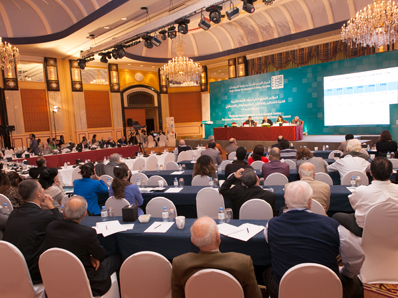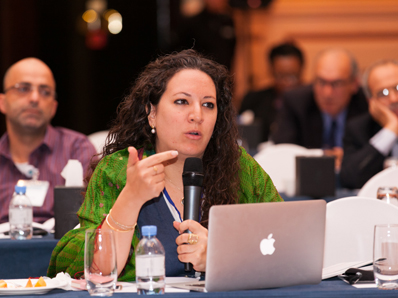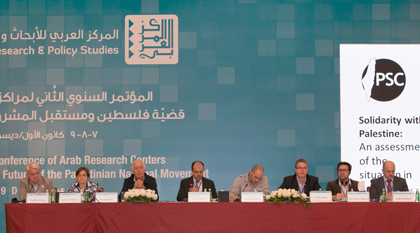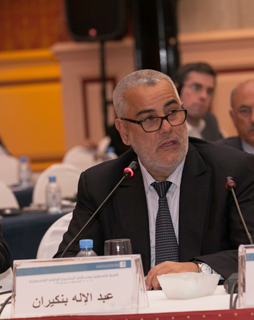On December 8, the second day of the ACRPS Second Annual Conference, participants focused on questions of Palestinian identity, Israeli policy attempts to erase identity, and the Palestinian National Movement and its representative frameworks.
Little hope for Israel changing from within
 |
| One of the sessions of day two of the conference |
In a session on Israeli Colonialism and its Policy, chaired by researcher Sara Ababneh, Ilan Pappé contributed with a paper on "Activism and Academia: the Case of Palestine" where he discussed the rise of academic and cultural critique of Zionism and its failure to incite change within the Jewish community in Israel. Pappé maintained that despite the harsh critique by Israeli intellectuals of state domestic and social policies following the October 1973 war, Zionist intellectuals and academics have reclaimed the public sphere and adopted a more extreme version of Zionism. Pappé concluded by saying the chances of being able to bring about change from within Jewish Israeli society without intense external pressure are very slim.
Researcher and coordinator at the Palestinian Mada al-Carmel Center, Mtanes Shehadeh spoke on "The 2013 Israeli Parliamentary Elections: Partisan and Political changes under a new Zionist consensus." In his view, the recent election results highlight the growth of a neo-Zionist consensus on Israel’s identity and its role and policies towards Palestinians and the creation of a Palestinian state. He also noted that the new fracture amidst Israeli parties emerging in recent years, following the Israeli protest movement in the summer of 2011, is based on the middles class’s refusal to carry on bearing the burden of military and economic service on Israeli society.
The Judaization of Palestine presents a real threat
The papers in the second part of the session on colonial policies concluded that the Judaization of Palestine presents a real threat. The scientific and methodological approach to the conclusions reached by four Arab academics presented details that were alarming. Hisham al-Maghari pointed to an Israeli policy of judiazation that has attacked Palestinian society in Jerusalem, an attack that is targeting the existence, culture and memory of Palestinians. Ghazi Falah echoed these findings, observing that the aim of Israel is to establish a single Jewish state that imposes a specific reality on the Palestinians. He noted how this is being prepared by means of policies that aim to uproot Palestinian identity, starting with the erasure of memory and the distortion of history and reality.
In more detailed fashion, Palestinian researcher Khalil al-Tafakji presented data on Israeli judaization on the ground. He presented a map which showed Israel’s intensive efforts to void international agreements with the Palestinians of their meaning and impose a new reality on the ground. In parallel, researcher Muhannad Mustafa addressed the position of settlers in the 1967 occupied Palestinian territories within the Zionist settlement project and the Jewish religious vision of this project. Al-Tafakji concluded that the transformations that have taken place in this community of settlers over the past two decades have contributed to the erosion of the messianic-religious impulse for settlement, and strengthened the settlers’ bonds with Israeli society.
In the discussion session, those attending were unanimous that a serious threat existed and that the avenues for the Palestinians were dead ends in the absence of an overall Palestinian national movement capable of confronting Israeli projects invasive of Palestinian space. At the same time those in attendance stressed the existence of a will and hope in the hearts of the Palestinians and the Arab peoples as a starting point towards the future.
Palestinian Identity and Israeli attempts to erase it
 |
| A participant during the discussions |
Under the title Transformations of Palestinian Society and its Political Institutions this session discussed Palestinian institutional reform starting with an important paper presented by Abdel Rahman al-Tamimi, director general of the Palestinian Hydrology Group, entitled “The Palestinian Authority Potential Collapse and its Implications for Basic Infrastructure Services.” This took as its starting point the hypothesis that the PA could collapse, be dissolved by Israel, or dissolve itself. He reviewed the potential effects of this on basic infrastructure services, be it Israel taking over their administration, or the creation of a Palestinian shadow government to take on their administration, or placing them under international control, whether by means of an Islamic state or otherwise. Al-Tamimi concluded that the state of these services will get worse in all of these cases.
In her paper on “The Role of Civil Society in Changing the PA’s Security Policy” researcher Nadia Abu Zaher highlighted the fragility of the role of civil society organizations (CSO) in changing security policies in Palestine. Underlining this weakness, she stressed, is the marginalization of CSOs, the growing number of violations against them, the absence of coordination between CSOs concerning proposed initiatives, weak internal financial capacity, weak research capability to analyse security policy, ineffectiveness of CSO monitoring of the security bodies, and their weak role in training these bodies on human rights issues. Abu Zaher presented a thorough review of the Palestinian CSOs performance starting from the first Intifada until the period following the split [between Fatah and Hamas] in 2007 which led to the division of the security agencies. Abu Zaher noted that the violations of the security agencies of both authorities against CSOs have increased.
In a session on Transformations of Palestinian Society and its Political Institutions, Bilal al-Shobaki presented a paper entitled “From Fragmentation to the Creation of Alternative Palestinian Identities” which addressed Israeli policies targeting Palestinian identity, a last bastion, he argued, in guaranteeing the continuity of Palestinian society as a distinctive national identity. In his view, Israel has continued to try to uproot elements of Palestinian identity and succeeded in creating geographically isolated areas where Palestinian society is spread. This takes the form of the Palestinian diaspora, the 1948 Palestinians, and the 1967 Palestinians. Nevertheless, Israel has been unable to negate the identity that unites all Palestinians wherever they are.
The researcher noted how a new threat has arisen as a result of the sharp political divide between the Palestinian movements, Hamas and Fatah in particular. He views the policies of Hamas and Fatah and of the PA in the West Bank and Gaza Strip as helping to create alternative disparate identities and argued that governments in both the West Bank and Gaza Strip have followed policies with social dimensions that have changed economic models. A continuation and expansion of this trend could lead to an effacing Palestinian identity which is the unifying framework for all Palestinians spread across the world.
The fate of the PLO and the Palestinian National Movement
One of the main topics of the conference was covered in two sessions under the title, The Future of the Palestinian National Movement and Representative Frameworks. In session one, researcher Ghassan al-Khatib discussed “the Future of the PLO and its political programme.” In his view, the transition of the leadership from that of armed struggle for the liberation of Palestine to the administration of the peace process on the basis of two states, played a role in the weakening of this historical leadership in favour of other new forces. Hamas is the most significant of these, particularly given the shakiness of the two-state option, and in light of the increased influence of the racist Right in Israel and the pace of settlement expansion. He concluded that the political leadership and its political programme based on negotiations have reached a dead end. Nonetheless he maintained that the PLO can still restore its role as the unifying framework for the struggle of the Palestinian people under a leadership that is more representative of the Palestinians and a platform more responsive to their legitimate aspirations provided there is national unity and agreement on a common political programme.
Researcher Ziyad Clot’s paper “The Palestinian National Project in Times of Revolution” considered the Palestinian struggle to be at a historical turning point today. The challenges confronting the Palestinian people, he argued, are more intense and wide-reaching than the usual factors influencing the day-to-day course of Arab-Israeli affairs. This is in the context of global changes such as an emerging international order where the US and Europe are in decline while a “new world” is rising, a world-wide crisis of legitimacy affecting Zionism, the tragic contradictions within the Palestinian people as represented in their inability to make international recognition of the Palestinian national project a reality on the ground, and finally the effect of the Arab awakening, which is reshaping the region and its peoples.
 |
| Discussion session on Global Solidarity Campaigns: Reality and Future Outcomes |
In his paper, “An Agenda for the Palestinian National Movement,” researcher Ahmed al-Azm put forward a proposed agenda for a new national movement inclusive of six points: 1) creating a formula to unify Palestinian activism, that might be called “The Federation of Palestinian Activism” to comprise the whole of historic Palestine and the diaspora. 2) Reform of the PLO from bottom up rather than traditional top-down reform. 3) The strategy of popular resistance. 4) A demand for a frank assessment of the various means of resistance. 5) Facing up to the fact that civil society and popular campaigns cannot attain the status of a liberation movement, and in consequence, the need to redefine what a liberation movement is. 6) A programme for superseding the objective economic and bureaucratic conditions that accompanied the establishment of the Palestinian National Authority and which have become an obstacle to resistance.
The Prime Minister of Morocco: I feel ashamed in face of the sacrifices made by Western activists for Palestine
Day two of the conference was rounded up with a discussion session on Global Solidarity Campaigns: Reality and Future Outcomes. Moroccan Prime Minister, Abdelilah Benkirane stated that he felt ashamed in face of the work and sacrifices made by European and American activists for the Palestinian cause. He was reassured however that the flame of Palestine still burned and would never be extinguished in the hearts of the Arab and Muslim peoples. He pointed to current constraints and the fact that current divisions did not serve the Palestinian cause. Benkirane added that now was the time for a realistic approach to the Palestinian issue.
 |
| Moroccan Prime Minister, Abdelilah Benkirane |
All the Arab and foreign researchers taking part in the session concurred that international solidarity with Palestine was facing various challenges hindering its development. In this context, Ben White, a British researcher and journalist specialising in the Palestinian cause, confirmed that international solidarity with Palestine was facing real challenges and needed great efforts to ensure its continuation and to ensure it bears fruit. He added that the Zionist idea had become rooted in Britain. For his part, Arafat Shukri, director of the Council for European Palestinian Relations in Brussels, stated that the international organizations and activists involved with Palestine solidarity appreciated the extent of their historical responsibility and assessed the Jewish lobby’s plans with care. Sarah Colborne, director of the Palestine Solidarity Campaign (PSC) in the UK, stressed that obtaining funding for solidarity was problematic in Britain. Even so, the Zionist lobby felt that it had started to lose the battle for public opinion in the UK.
Hugh Lanning, chair of the PSC in the UK, said that their organization clung to its independence from governments and so only received funding from individual donors. This implied the need to expand the scope of popular outreach and make progress in the political sphere. He added that PSC was not racist or anti-Semitic. Spanish Palestine solidarity activist and economist Fernando Sancho Martinez confirmed that he and his colleagues would continue to work in solidarity with the Palestinian people as their cause was just. Stuart Rees, political analyst and correspondent for the American Atlantic Magazine, pointed to the fact that Palestine solidarity activists in Australia were faced with constant attacks from the Jewish lobby there which accuses them of anti-semitism and racism. He added that the diversity of voices and the lack of Palestinian unity affected the work of international solidarity activists. He indicated that activists would continue their humanitarian mission as they were demanding peace together with justice.
Finally, activist Adam Shapiro described the harassment faced by Palestine solidarity activists after leaving Gaza at the hands of some governments. Shapiro stated that the international solidarity campaigns had over the years produced positive results in Europe and the US, which gives hope.